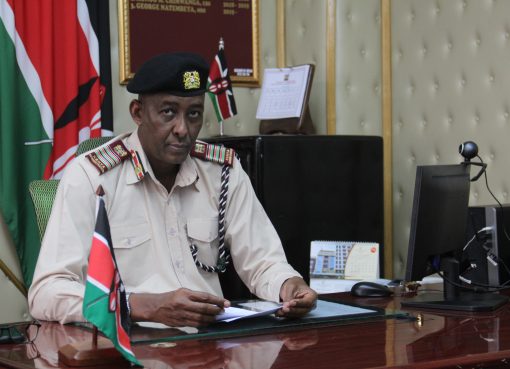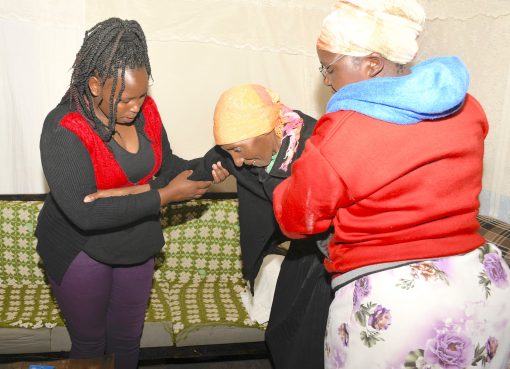Ministry of agriculture is set to embrace theatre and performing arts to encourage the youth to embrace farming.
Nakuru County Coordinator for the National Agriculture and Rural Inclusive Growth Project (NARIGP) Njoroge Githunguri noted that drama had the potential to change attitudes of the youth and transform agriculture into an appealing venture.
Githunguri observed that though agriculture presented the biggest opportunity for creation of employment to absorb the youth and ensure achievement of food security the sector had remained largely unattractive.
“Theatre is a new and effective tool to reach a wider number of young people and positively influence behaviour change. We will use it to change perceptions about the farming sector whose unattractive symbol has been the hoe.
When you act, people pay attention and you get to pass your message successfully. Actions changes behavior better than theories,” he said.
Githunguri noted that with one of the fastest internet penetration rates on the continent, Kenyan youth can exploit information technology for various value-addition ventures in agri-business.
He was addressing 35 youth groups in Nakuru who underwent participatory theatre training organised by NARIGP in collaboration with the County government.
Head of Participatory Education Theatre at NARIGP Susan Njeri said creative and sustainable ways must be initiated to present the youth with the allure and career progression currently lacking in agriculture.
She said as Kenya’s population continues to grow the country can only harness the demographic dividend by creating a huge working-class youth base.
“Agriculture is undoubtedly the sector that can absorb most of the unemployed young people in Kenya as well as semi-skilled to highly skilled labour.
A change of perspective is warranted here. We want to use performing arts to portray agriculture as a business. Theatre in all its forms is an effective tool that will help the youth discover opportunities and get solutions to challenges posed by joblessness,” Njeri said.
According to the World Bank one million young people join the work force in Kenya every year, which means that Kenya needs a million new jobs every year for the next 10 years to keep up with the rapidly-expanding youth bulge.
Of these young people, only about one in five is likely to find a formal job, with the rest either being unemployed or engaged in some non-wage earning occupation. At the moment, Kenya has about 81 dependents for every 100 working-age adults
Emma Phoebe, a thespian from Bahati Sub-County said performing arts had the capacity to disseminate accurate, relevant and timely information to farmers in terms of what seed variety suits given regions, how to deal with pests and diseases, value addition to their products, proper storage and marketing of their produce.
She said drama should be used to address unpredictable weather patterns and promote various technologies that can be used by farmers to get appropriate information about proper agronomical practices.
A performing artist from Molo Sub-County, Joyce Nyata said drama can be used to portray farming as a reliable form of employment, adding that it is effective in encouraging the youth to embrace untapped value addition chains in the sector.
Kenya Youth Agribusiness Strategy 2017 -2021 indicates that the low interest in agriculture among the youth could partly be attributed to the public sector systems that have concentrated more on production with limited value addition, processing and marketing.
The strategy paper states that majority of those engaged in agricultural activities are aged between 50 and 65 years and still predominantly practice traditional and subsistence farming practices.
“The decreasing number of young people involved in farming as an occupation or business is a national signal of distress in the agricultural sector. This is already negatively impacting on the economy,” states the paper.
A key premise of the National Agricultural and Rural Inclusive Growth Project is the importance of linking farmers, Common Interest Groups (CIGs) and Vulnerable and Marginalized Groups (VMGs) organized along priority Value Chains (VC) to markets.
Twenty-one counties are set to benefit from the World Bank-funded National Agricultural and Rural Inclusive Growth Project.
The World Bank funded project being undertaken in 21 counties aims to increase agricultural productivity and improve food security in 420 wards within the devolved units.
The project is targeting 360,000 people in Turkana, Makueni, Meru, Kitui, Embu, Kilifi, Kwale and Narok. Others are Trans Nzoia, Nandi, Vihiga, Kisii, Nyamira, Migori, Homa Bay and Bungoma.
Under the project Nakuru County has been able to fund 8 Community Driven Development Committees (CDDCs) to a tune of Ksh 9,564,920 from the World Bank which is 40% of the total project cost and 60% will be disbursed later as work progresses.
It covers the sub-counties of Molo, Njoro, Bahati, Naivasha and Kuresoi North
According to the Global Hunger Index 2018, Kenya is among the 45 countries out of the 119 countries ranked in the world that are still grappling with food insecurity.
The report indicates that for every three Kenyans, one is grappling with severe food insecurity and poor nutrition.
The report further claims that about 20 per cent do not meet the required dietary needs that can sustain a healthy and productive life.
Drought, extreme poverty and poor governance are identified in the report as contributing factors subjecting people to hunger.
“Despite huge challenges, Kenya has made significant progress in reduction of hunger and under-nutrition rate,” reads the report in parts.
The report recommends that Kenya should prioritize food security policies at county and national levels of governments.
By Anne Mwale/Dennis Rasto
Monday, December 23, 2024



